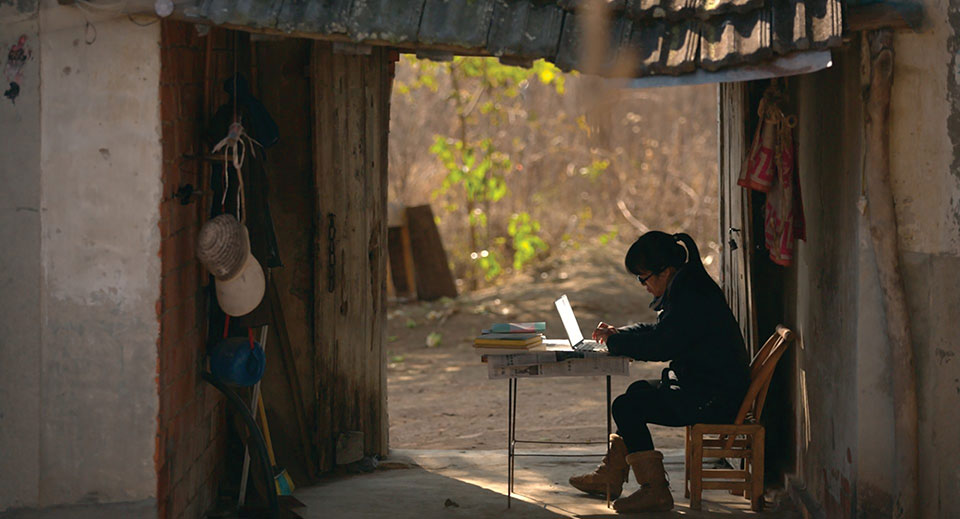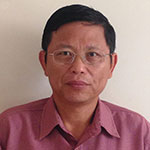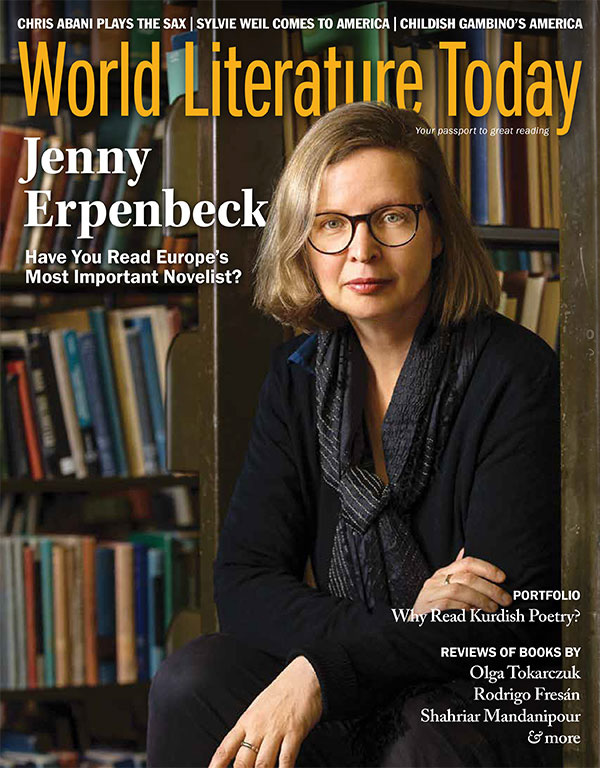Yu Xiuhua: A Life Lived in Poetry

She is a subsistence farmer with a ninth-grade education and a disabled person with speech and writing challenges, yet she has been the most talked-about and best-selling poet in China. Her name is Yu Xiuhua, and her life is a triumph of poetry.
The year 2015 started with a bang for Yu Xiuhua. In a span of months, her name graced front pages of newspapers, prime-time television shows, and far corners of the internet. A country woman no longer, she had become the most talked about poet in China. Three years later, the “Yu Xiuhua Craze” shows no sign of abating, sustained by the new poet laureate’s consistent presence on social media, her untiring appearances at promotional events, and three best-selling collections of poetry, in addition to debate and controversy, all of which continues to attract readers to her work and helps pique their interest about the person behind her writings. Already, an award-winning documentary has been made about her, and two of her poems have been set to song by popular musicians. A feature film based on her life story is reportedly in the making.
Yet Yu Xiuhua’s existence before her sudden fame was quite unremarkable, in fact, so prosaic as to be indistinguishable from the lives of China’s rural masses. She was born in 1976, the only child to subsistence farmers in the marginal lands of Hubei Province. In contrast to the country’s flourishing urban centers, Yu Xiuhua’s village of Hengdian is an unintended time capsule of remote rural China: rustic, isolated, and unchanging, where the only signs of modernity are early-model cell phones and slowly arriving internet connections. A typical life path for a girl like Yu Xiuhua, if she wants something better than the life of her parents, would be to migrate to the big cities after basic schooling and become an assembly-line worker in the plant of a manufacturing powerhouse such as Foxconn, the famed iPhone maker. This life path, however, was not possible for Yu Xiuhua because of the cerebral palsy she suffered from a difficult birth.
It is not hard to imagine what life was like for a young disabled girl in a rural Chinese village. For Yu Xiuhua, reality was not a matter of making choices but of dealing with dependency and basic needs. She moved around by crawling until age six, when she learned to walk unsteadily with the help of crutches. She had difficulty speaking and writing, which made learning and communicating quite challenging, forcing her to drop out of school in the tenth grade. She was unable to do typical farm work other than simple tasks such as cutting green grasses to feed her family’s rabbits. She was judged by the villagers as an “idler.” At age nineteen, her parents arranged her marriage with a man from out of town, but the man was always away working in the cities. There was no attraction, no love between them, and Yu Xiuhua was only glad that she did not need to quarrel with him in person every day. Life was so hard, her prospects so dim, that she once considered to try begging for a living because disability for a beggar is a natural advantage, but she could not bring herself to kneel, which is a requirement for begging in her part of China, so she gave up.
These poems represent spent time, and time spent means living.
Unbeknownst to people around her, Yu Xiuhua was living the secret life of a poet while struggling in her roles of daughter, wife, and mother. This was a life of choice, rather than a given. Poetry was an easy choice because “it is a genre of the fewest words among all types of writings,” so says Yu Xiuhua, which is beneficial when writing Chinese characters with a pen is such a struggle. Her first poem, written in 1998, entitled “Body Print,” starts with this line: “I crawl forward in the mud.” After that, the river of poems kept flowing. By the first months of 2015, when fame struck, she had accumulated over two thousand poems. These poems represent spent time, and time spent means living. For Yu Xiuhua, it is a living reflecting on, but also parallel to, her perfunctory village life; it is an approach, one may say, literally as well as figuratively, to Martin Heidegger’s vision of “man dwells on this earth poetically.”
The space for Yu Xiuhua’s “poetic living” is the internet, which she first found in an internet café (“net bar” is a literal translation from Chinese) in the nearest town and later through a used computer located in her cramped bedroom (a computer donated by a few poet-friends). The internet connects Yu Xiuhua with strangers from the invisible but massive online poetic communities and makes her writing more manageable and more rewarding, although still a labored endeavor; but her retreat further isolates her from her family and the villagers, who now more than ever consider her an enigma and an irritation, even after her writing is no longer a secret. Internet literature is a good signpost of China’s advanced net economy and has been a phenomenal success if only measured in terms of words typed, eyeball counts, and the bank accounts of some superstar net writers. Dominated by fiction and often scorned by critics and academics, the genre is a kaleidoscope of kitschy entertainment and stylish utopias, imitative extravaganza and enticing fantasy. But beyond the commercial excesses of internet literature lie its values of access and the democratization of writing, not to mention its embrace of experimentation. So Yu Xiuhua may consider herself fortunate to be living in the age of the internet, which transforms her loneliness into a virtual existence and enables her to create a poetic persona of voicing and connecting. The making of this new poetic persona for Yu Xiuhua started with her steady online posting of her work and culminated in her poem “Crossing over Half of China to Sleep with You” that went viral in the final days of 2014.
Yu Xiuhua may consider herself fortunate to be living in the age of the internet, which transforms her loneliness into a virtual existence and enables her to create a poetic persona of voicing and connecting.
Netizens of China are familiar with outrageous titles designed to compete for their ever-shorter attention spans, but the catchphrase “sleep with you” in the title of a poem is still surprising and enticing. These are the opening lines:
Actually, sex is almost the same
whether on top or at the bottom
It’s just the force of collision between
two bodies
the blooming of a flower propelled by
this force
the fictitious spring created by
this flower
which we mistake as life restarting
In the Chinese text, where “sex” occurs is the expression “shui ni he bei ni shui,” literally, “sleep you and slept by you,” an expression associated with colloquial vulgarity and low social class. The substitution of love with sex is a defiant act, then, a stripping of the former’s cultural wrappings and its poetic conventions. We should note that the speaker does not offer a context for comparing the two but merely articulates the wish of “sleep with you,” while fully aware of the deficiency of this wish. If this poem is a love poem, and indeed has been read as a love poem by millions of people, it is a vision of love tinged with defects, irony, and exasperation.
Love is commonly understood as the first charge of poetry, which is how people appreciate poetry most naturally and aesthetically. In a place like China where poetic tradition runs long and deep, quotable lines from the past are often spontaneous exchanges of affection and friendship. The experience of love and its expression, however, face new challenges in a contemporary China characterized by rapid economic development, manufactured urbanization, and unsettling social stratification. Relationships are easier because people are living closer, but love is harder, thus more precarious, because people have become more distant from each other due to pretenses and illusions of all kinds, such as money and status. It is nothing out of the ordinary for Yu Xiuhua to speak of love as a poet, but quite unusual the way she speaks of it: rugged language and bombastic howling that bear down on naked desire and wanton longing. Here is a context for love, certainly, but more precisely here is the context of the lack of love, which has enhanced Yu Xiuhua’s relevance to her readers. When the person behind the poem becomes exposed and familiar, that is, when readers discover Yu Xiuhua’s life of poverty, disability, and emotional starvation, they experience her sincerity and authenticity, which in turn fuels her popularity to the stratosphere. Online reading is not conventional reading, the one informed by internal textual restraints promoted by the New Critics; rather, it is a reading of expansive searches and association, in which all traces of the author in the virtual and the real worlds become a text for discussion and comment. Yu Xiuhua is not the first Chinese author to be subjected to such a reading but the first one who has reaped its full benefits.
It is nothing out of the ordinary for Yu Xiuhua to speak of love as a poet, but quite unusual the way she speaks of it: rugged language and bombastic howling that bear down on naked desire and wanton longing.
The majority of Yu Xiuhua’s poems are love poems, which is surprising to her critics and readers, but not to herself. Asked by a television host why she is so interested in the subject of love, Yu Xiuhua responded by saying, “The less I have, the more I want to write about it.” The host then went on to wish her good luck in finding her true love soon (Yu’s divorce was finalized in late 2015), but Yu Xiuhua’s answer, “Maybe in my next life,” stunned the host and the live audience. This is Yu Xiuhua at her truest state: blunt yet sincere, stubborn yet engaging, projecting confidence while revealing a sense of inferiority. Yu Xiuhua fights fate with the power of poetry while also acknowledging the inevitability of her destiny. In a poem simply titled “I Love You,” she writes:
Every day I live with anticipation: fetch water,
cook rice and take medicine on time
I bag myself in like a piece of dried fruit peel
when the sunshine is good
I drink all kinds of teas: chrysanthemum, jasmine,
rose and lemon
as if they would guide me by their beauties onto
the road to springtime
These lines serve as a self-introduction to an unspecified person of affection faraway. They portray a life of calm and composure, maybe even a measure of happiness, but they also reveal restless longing and hope, with a shadow of misgiving lurking in the corner. Such a mixed bag of self-perception is collected in the metaphor of tare (a weedy grass) in the poem’s ending lines:
If I send you a book, it would not be a book
of poetry
I will send you a book about plants, about crops
which will tell you how rice is different from tare
and how a grain of tare worries about springtime
To understand tare as a metaphor requires familiarity with the rural life, against which Yu Xiuhua constructs her poetic persona. It is the life of crops, mud, and sweat that speaks constantly through her inspired images and fresh metaphors. Rice is the desired norm, but tare is the useless divergent. Yu Xiuhua’s self-identification with tare reveals a profound sense of alienation that begins with disability but echoes through every part of her life.
Yu Xiuhua fights fate with the power of poetry while also acknowledging the inevitability of her destiny.
If disability is the lens through which Yu Xiuhua is being observed by the world, it is also the one through which she views herself, sometimes sympathetically, but more often critically, approaching a confessional self-obsession that lays bare her fear and hope, darkness and faith, pain and desire. Who can stand indifferent to these lines: “This is how I often spend my nights: Tearing flowers to pieces / – I doubt my love, every time I did I broke into pieces / I doubt my born imperfections: / the source of my instinct for destruction.” Or remain untouched by these: “No matter how I try, I cannot arrive at his level / I believe in love for him and for others / but not in my own.” In this poem “Hands – To Father,” she angrily takes on her father, maybe God himself:
I will stand before you, welcoming death
I will avenge you, the artist in the village
a master of clay-making
who gave me a pair of crooked feet
while shaping me into a human
Even if you would cut off your ribs to
remake my legs
I could never walk like others
. . . . . . . . . . . . . . . . . . . . . . . . . .
Please don’t pull out new weeds on my grave
Next life, I will not be your daughter;
It would be better to be a guard dog for the
Yu family
These lines bring us close to one of Yu Xiuhua’s darkest moments, where we sense a rupturing of pain and bitterness; but a serene resilience and a yearning for life are still in full display.
The popularity of Yu Xiuhua derives from her mystique as a person with a disability and as an unconventional poet whose unique life intersects her poetic persona. She is a whiff of fresh air to a contemporary Chinese poetry worn out by intellectual posturing and complicated wordplay that make reading an exhausting game of the mind. Reading Yu Xiuhua is a far less daunting task because the meaning is always located within her disfigured body and injured soul. This version of reality is a sort of depressive realism that communicates truth and disperses illusions. We do see cases of Yu Xiuhua’s surprising word choices and fragmented images, which carry the flavor of the Misty Poetry of the 1980s, but more often she impresses with her language of sentience and artless simplicity; she writes as she lives, constantly working with the tension between this life and its alternatives. She once said, “What is poetry? I don’t know, neither am I able to say. It is about the churning of emotions, or their mooring at the bay.” It is hard to imagine that readers would accept these words by any other established poet, but they have become the catchphrase of Yu Xiuhua’s “personal poetics” and are printed on the back covers of her books.
Yu Xihua is who she is, and is accepted as who she is, and her unquestionable authenticity is at the center of her life and her writing.
Sichuan University and the University of Arizona











